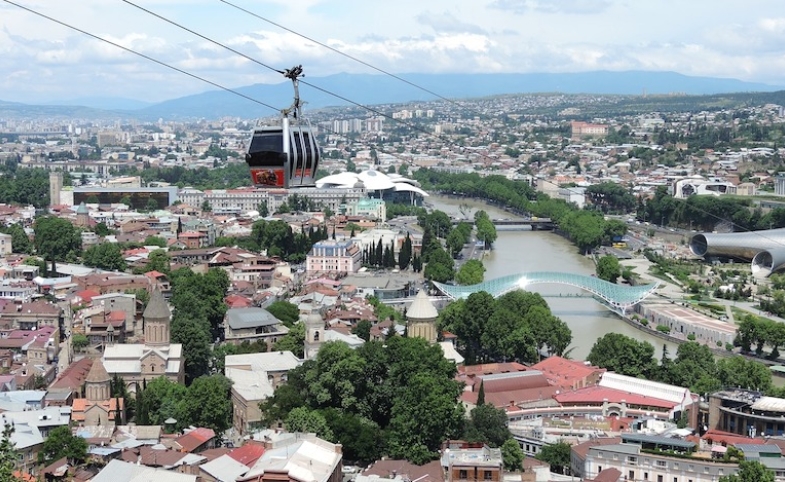India’s primary, and by far its most significant aspect of soft power, lies in Indian literature and knowledge systems—i.e., its education. It is in this context that the grant of one thousand integrated Ph.D. fellowships...
KEEP READINGThe CPD Blog is intended to stimulate dialog among scholars and practitioners from around the world in the public diplomacy sphere. The opinions represented here are the authors' own and do not necessarily reflect CPD's views. For blogger guidelines, click here.

Exchange Diplomacy and U.S.-Georgia Relations
The best thing about public diplomacy is that it matters daily. Through exchange diplomacy, the United States annually reaches people in more than 100 countries worldwide. The Republic of Georgia is one of the countries where U.S. exchange diplomacy matters. Given the U.S.-Georgia strategic partnership, it is worth keeping in mind how the U.S. government’s exchange program alumni activities in Georgia can shape U.S.-Georgia relations.
Exchange diplomacy can guarantee a sustainability of public diplomacy. Post-exchange activities, where alumni build on their exchange experience, might make a more fully realized picture of how U.S. public diplomacy succeeds across borders, societies and cultures. In this regard, alumni engagement becomes one of the core elements of public diplomacy. Gaining a deeper understanding of American culture and society through a wide range of exchanges—education, cultural or professional—helps alumni to bring new vision and skills to benefit their local societies.
Nowadays expanding people-to-people and cultural exchanges is one of the pillars of the U.S.-Georgia strategic partnership. Post-exchange activities are a good example of how the U.S. government exchange program alumni in Georgia represent their American experience in local contexts. Georgia has more than 5,000 alumni who participated in various education exchange programs, including, but not limited to, the Future Leaders Exchange Program (FLEX), the Global Undergraduate Exchange Program (UGRAD), Fulbright and Study of the United States Institutes (SUSI). Annually, up to 200 individuals from Georgia participate in education exchange programs to the United States.
Post-exchange activities are a good example of how the U.S. government exchange program alumni in Georgia represent their American experience in local contexts.
Although the number of American exchange participants in Georgia is much smaller, exchanges like the English Language Fellow Program or Fulbright bring American specialists, educators and professors from the United States for teaching and research opportunities in Georgia. These exchanges build an effective network of alumni. In addition, quantity and quality of alumni activities can matter more and more in exchange diplomacy. Articulating their forward-looking vision, alumni are more able to build bridges among local communities in Georgia by delivering timely and essential projects ranging from women’s empowerment to inclusive education or entrepreneurship, to name a few. And there is much more to be learned from the ways that education exchange participants from Georgia approach further integration of Georgia with the West.
One of the main opportunities for the post-exchange activities in Georgia is engagement in the projects of the alumni association. The U.S. Government Exchange Program Alumni Association of Georgia, EPAG in short, unites over 1,000 U.S.-educated alumni, who bring Western values and innovative ideas to Georgia. The U.S.’s exchange diplomacy in Georgia makes U.S.-Georgia relations far-reaching. The history that EPAG makes can be its one of the most prominent aspects. EPAG was originally established as the Muskie Alumni Association of Georgia, known as MAAG, in 2004. MAAG initially aimed to bring together only Edmund Muskie Graduate Fellowship Program alumni. A strategic decision made by a MAAG board in 2013 opened MAAG’s doors to alumni of all other U.S. government-funded programs. Followed this decision, MAAG was changed into EPAG in 2014.
This change increased the network, capacity and impact of the association on both local and international levels. Through forums, conferences, trainings and other educational and social activities aimed at utilizing exchange experience, EPAG creates a well-organized and well-connected network of professionals to contribute to and sustain active civil society engagement in Georgia. In 2019, EPAG celebrated its 5th anniversary by organizing a professional networking event for Georgia’s exchange program alumni. This event showed that EPAG is more than a forum for intellectual collaboration and social interaction and that the U.S.-educated alumni have a solid potential to build a more democratic future for Georgia.
EPAG’s work is one of the examples of how U.S. exchange program alumni associations operate in various countries. The diverse and inclusive post-exchange activities alumni organize and implement can also be used as an indicator to measure the success of U.S. public diplomacy initiatives.
It is apparent that U.S. government exchange program alumni can make much of Georgia’s democracy. Through alumni diplomacy, which includes post-exchange engagement in local communities, they share their American exchange experience into Georgia’s reality. It can assist U.S. public diplomacy to reach out to more foreign publics. What is certain is that this tendency will be of growing importance in the upcoming years.
Visit CPD's Online Library
Explore CPD's vast online database featuring the latest books, articles, speeches and information on international organizations dedicated to public diplomacy.
POPULAR ARTICLES
-
January 29
-
January 20
-
January 28
-
January 2
-
January 8
Join the Conversation
Interested in contributing to the CPD Blog? We welcome your posts. Read our guidelines and find out how you can submit blogs and photo essays >.













